Croatia Reports 217 New Coronavirus cases, 11 Fatalities
ZAGREB, 27 Sept 2021 - In the past 24 hours 217 coronavirus cases and 11 related deaths have been confirmed in Croatia, the national COVID-19 crisis management team said on Monday.
There are 7,145 active cases and 720 hospitalized patients, including 97 on ventilators, while 23,204 persons are self-isolating.
Croatia has registered 400,108 coronavirus cases to date as well as 8,606 deaths and 384,357 recoveries, including 1,245 in the past 24 hours.
To date, 2,793,951 persons have been tested for the virus, including 3,016 in the past 24 hours, and 44.5% of the population has been vaccinated, including 53.39% of adults, of whom 50.15% fully.
For all you need to know about coronavirus specific to Croatia, make sure to bookmark our dedicated COVID-19 section and select your preferred language.
SOA: Pandemic Has Spurred Rise in Extremism, Radicalism
ZAGREB, 27 Sept 2021 - In its report for 2020-21, the Security and Intelligence Agency (SOA) says Croatia is a secure and stable democracy but warns about rising extremism and radicalism due to the COVID-19 pandemic.
We are witnessing the biggest pandemic in modern history which has caused unprecedented disruptions in everyday life and enormous damage to the global economy, SOA director Daniel Markić says in the introduction.
The pandemic has additionally increased extremism and radicalism, notably due to disinformation and conspiracy theories concerning Europe's response to the crisis and the effectiveness of democratic and liberal political and social systems, SOA's seventh report says.
Despite 20 years of international efforts in bringing democracy to the local society, the Taliban have taken power in Afghanistan.
SOA also monitored the increasing world dominance of geopolitical reshufflings and competitions as well as the strengthening of the economic, political, and value challengers to liberal democracies in the international order.
Climate change is increasingly showing its consequences, the report says.
Non-Western actors active in the southeastern neighborhood
It indicates that non-Western actors are active in Croatia's southeastern neighborhood and that reforms aimed at reaching European standards are slow.
The Western Balkans is still burdened by unfinished stabilization processes and unsolved inter-state and inter-ethnic issues as well as difficulties in achieving European integration due to insufficient reforms.
Unfavorable political and economic conditions facilitate the strengthening of radical and extreme tendencies as well as rifts within fragile societies, and social and inter-ethnic tensions may lead to incidents, notably in communities with unsolved inter-ethnic relations.
Bosnia and Herzegovina are still politically unstable, primarily due to the different views its constituent peoples have on the country's future constitutional and legal system.
Failure to reach a Serbian-Albanian agreement on Kosovo continues to contribute to instability in the region, and the social rift in Montenegro, where parties of anti-NATO, pro-Serb, and pro-Russian orientation have significant political power in relation to sovereignist, pro-Western forces, is causing particular uncertainty in the Western Balkans.
Promotion of the "Serbian world" additionally destabilizes delicate relations
In the regional context, some state officials in Serbia are promoting the concept of a "Serbian world" as a single Serbian political people and a single political and state union of all Serbs in Southeast Europe in which all Serbs should follow one political direction, that of Serbia.
The promotion of such ideas by Serbia's top officials is additionally destabilizing the delicate inter-ethnic and inter-state relations in Southeast Europe, notably in regards to BiH and Montenegro.
Organized crime in this part of Europe is additionally bolstered by the proliferation of illegal activities, while hotspots like Syria and Libya continue to represent sources of instability and threats.
Cyber technologies have facilitated large-scale cyberattacks aimed at stealing state and industry data, while illegal migration has increased enormously in Southeast Europe, with hundreds of thousands of migrants passing through.
Croatia target of dozens of state-sponsored cyberattacks in recent years
SOA warns that state-sponsored cyberattacks are becoming increasingly common in espionage.
Those attacks are aimed at carefully selected targets that have been well studied in advance, and they are carried out by state-sponsored APT (Advanced Persistent Threat) groups that are closely linked to the security and intelligence systems of individual countries. Such cyber-attacks are primarily aimed at EU and NATO member states.
In recent years, Croatia has been the target of dozens of state-sponsored cyber attacks. The largest number of them were attempting to break into the information and communication systems of the Ministry of Foreign and European Affairs and the Ministry of Defence.
SOA concludes that cyber resilience is becoming a key to national security in the digital era.
The past period was also marked by the creation, rapid expansion, and territorial defeat of the Islamic State, the largest terrorist organization in the world, and the agency has also been monitoring how the spread of democratic values in the world has been replaced by authoritarian tendencies with the return of Cold War tensions, espionage, and the spreading of fake news and propaganda.
There are currently no identified direct terrorist threats to Croatian institutions, citizens, or interest from terrorist groups, and the threat of organized attacks by terrorist groups is still low, but the possibility of a terrorist attack (primarily by independent attackers) can never be ruled out.
Although ISIL and Al Qaida have been significantly weakened and their capacities for carrying out external operations and attacks have been reduced, they remain a threat to Europe. In EU member states, the level of threat from Islamist terrorism varies from low in Central and Eastern European countries to medium or high in most Western European countries.
Many steps forward in the security sphere
Since its first public report, SOA has also followed a number of developments in the security sphere.
EU and NATO membership has allowed us to multiply our capabilities and strengthen our security mechanisms and links to other democratic security and intelligence systems; European countries are getting closer to confronting common security threats; Croatian society and institutions have confirmed their stability and efficiency in many crises situations, the report says.
In addition to that, new infrastructure projects have strengthened energy and national security, SOA says, noting that they are building a new generation of employees through public calls.
All those changes show that security dynamics in the modern world are extremely fast and often unpredictable, new and non-traditional security threats are emerging, and the role of timely and accurate information and assessments is becoming crucial, SOA says.
The report published on the SOA website also stresses that there is no indication of significant destabilization for Croatia, even at such a challenging time and in such a dynamic security environment.
For more on politics, follow TCN's dedicated page.
Voice of Entrepreneurs Director Running for President of Croatian Chamber of Economy
September 27, 2021 - An interesting candidate has entered the race to be the new President of Croatian Chamber of Economy - Dražen Oreščanin Executive Director of the Voice of Entrepreneurs Association (Glas Poduzetnika - UGP)
The press release in full:
THE EXECUTIVE DIRECTOR OF UGP IS READY TO ASSIST THE INSTITUTION THAT HAS BEEN IN CRISIS FOR YEARS
Dražen Oreščanin is running for president of the Croatian Chamber of Commerce
After the significant role he played in founding today's leading and most massive association of entrepreneurs with almost 18,000 volunteer members, Dražen Oreščanin has decided to make his experience and knowledge available to the Croatian Chamber of Economy, an institution in a great and long-standing crisis.
The state leadership has very often made unfounded and inappropriate accusations against the Association of theVoice of Entrepreneurs that the Association wanted to destroy Croatian institutions such as the Croatian Chamber of Economy. This candidacy of one of the leading people of the Association not only denies the statements of the state leadership, but also indeed shows the opposite to be the case, that UGP wants to fix and change for the better everything that politics destroyed and spoiled in the mandates of the previous and current president, who were and are primarily the selection of political elites.
The Croatian Chamber of Economy must be led by entrepreneurs and must work in the interest of entrepreneurs. Today, the vast majority of forced members of the Croatian Chamber of Economy have no confidence in this institution and do not want to be its members. Oreščanin has the full support of UGP President Hrvoje Bujas and UGP Board of Directors for his candidacy, who believe that modern and independent chamber organizations, which are at the service of their members, are one of the fundamental goals of the Association.
"Finally, entrepreneurs have a candidate for president of the Croatian Chamber of Commerce, and if they were elected, I am sure that Drazen would be, because with his knowledge and experience, and his work so far, he deserves it. Burilović was appointed by politics, it is time to leave, and for the Croatian Chamber of Economy to become an independent association based on voluntary membership " - said Hrvoje Bujas, president of UGP.
Dražen Oreščanin's program for restoring the trust of entrepreneurs in the Croatian Chamber of Economy is based on three strategic points.
The first point is the depoliticization and restoration of the reputation of the Croatian Chamber of Economy. The functioning of the Croatian Chamber of Economy must be depoliticized and the leadership of the Croatian Chamber of Economy should be independent of politics and political parties. The Croatian Chamber of Economy must no longer be a dumping ground for worn-out political personnel and a place for the employment of party youth.
The second point is voluntary membership. In this way, the Croatian Chamber of Commerce will get rid of all those who do not want to be members and will be able to focus on those who really want to be members and support them efficiently and well, instead of spending resources (which someone has to pay) on a large number of small members. pay the membership fee according to the existing bill. In the future, the Croatian Chamber of Commerce should function on a market basis.
The third point is to raise the quality of services and attract new volunteer members. The Croatian Chamber of Economy must provide top services to its members, and thus attract new members, whether they are existing or newly established companies. It is necessary to redefine the existing services, and to design and implement new services that will bring additional value to the membership.
Dražen Oreščanin's impeccable business and entrepreneurial career is a guarantee that these changes will be made. Dražen is one of the founders and partners, and a long-time President of the Management Board of Poslovna inteligencija d.o.o., a company that today has branches in seven countries and employs 140 people in Croatia, and a total of 170 people. Business Intelligence is the winner of the Golden Marten plaque of the Zagreb Chamber for 2018. He has many years of experience in running entrepreneurial associations - from 2013 to 2016 he was a member of the Board and President of the Croatian Association of Independent Software Exporters (CISEx), and since April 2020 he has been the executive director of the Voice of Entrepreneurs.
"The only right way to build civil society is to build independent institutions. In Croatia, all civic institutions, including the Croatian Chamber of Economy, have always been dependent on politics and political appointments. If I am elected to the position of President of the Croatian Chamber of Economy, it will be a precedent and the real beginning of changes and reforms. I believe that the ruling policy will show maturity this time and that it will not interfere in the process of electing the President of the Croatian Chamber of Economy by forcing a party candidate. I would like to have an opponent who, with his knowledge, experience and attitude, is really a real competitor, and not a puppet of political players, so let the President of the Croatian Chamber of Economy become the best, not the most suitable candidate. We have to return the Croatian Chamber of Economy to its original owners, which are Croatian entrepreneurs. " - said Dražen Oreščanin, executive director of the Voice of Entrepreneurs association and candidate for president of the Croatian Chamber of Economy.
***
The VOICE OF ENTREPRENEURS initiative was launched as a self-organization of citizens, mostly small entrepreneurs, after the publication of the first package of economic measures of the Government of the Republic of Croatia, which the initiators assessed as insufficient. Since in less than 15 days it gathered more than 100,000 entrepreneurs, craftsmen, self-employed and private sector employees and attracted a lot of media attention with its uncompromising demands and appearances, GLAS PODUZETNIKA positioned itself as a relevant factor in public debates on determining Croatia's new economic direction. The same was confirmed by the Government of the Republic of Croatia, which, within the second package of economic measures, adopted some of the proposals of the initiative and thus confirmed its undeniable impact. At the request of the members of the initiative, the Association GLAS PODUZETNIKA was founded, which has gathered more than 17,700 members since its establishment, and the Association is supported by over 250,000 citizens of Croatia.
For the latest news from the Voice of Entrepreneurs Association, follow the dedicated TCN section.
Lastovo Municipality Day: Road Being Built, Equipment Being Purchased
September the 27th, 2021 - To mark 2021's Lastovo Municipality Day which took place this past Sunday, County Prefect Nikola Dobroslavic arrived with a delegation and spoke about the steps being taken to make Lastovo more connected with the mainland.
As Morski writes, the central part of the celebration of Lastovo Municipality Day was the Formal Session of the Municipal Council held at the House of Culture (Dom Kulture), where the audience was addressed by Prefect Nikola Dobroslavic, who was also an envoy of the President of the Croatian Parliament.
Stressing how important it is that islands like Lastovo, like all other areas across the southernmost Dubrovnik-Neretva County, develops evenly, the prefect said that the first step towards that was the establishment of a daily high-speed line that connects Lastovo with the county centre.
He added that Dubrovnik-Neretva County will continue to support projects that contribute to the development and preservation of the natural beauty of Lastovo and said that at a recent meeting in the municipality, two extremely important contracts for Lastovo were signed - Dubrovnik-Neretva County is set to provide 130,000 kuna for the purchase of equipment for the remediation of pollution in the sea around the island, and with the director of the County Road Administration Ivo Kastelan, a contract for the construction of a local road to Skrivena Luka which will be 2.7 kilometres long and be worth six million kuna was signed.
County Prefect Nikola Dobroslavic also pointed out one of the capital projects as part of Lastovo Municipality Day celebrations, which is the reconstruction of the Port of Ubli worth 60 million kuna, which will begin soon.
With congratulations extended for Lastovo Municipality Day and the feast of St. Kuzma and Damjan, Prefect Nikola Dobroslavic also reminded all those present that the Lastovo Islands Nature Park is celebrating its 15th anniversary this year and congratulated the management of the park, wishing them to continue to wisely continue to lead and preserve the exceptional beauty Lastovo boasts.
For more, follow our dedicated lifestyle section.
Who is Biserka Boric? 61 Year Old Letter Addressed to Split Woman Found
September the 27th, 2021 - A 61 year old letter addressed to Split woman Biserka Boric has been discovered in Trogir and the owner of it, or perhaps a relative of theirs, is now being sought.
As Morski writes, a few days ago in the popular central Dalmatian town of Trogir, near the monastery and the church of St. Dominic, a man from Kastela found a letter. It wasn't just any letter, but a letter dated in 1960, addressed to a certain Biserka Boric, who apparently lived at Radnicka ulica 11 in Split. The Split woman perhaps never received the letter, and in what some would say is perhaps naive hope, everyone involved is now hoping that it can finally be given to her.
The letter had been opened, meaning that it has been read, but it's difficult to know when it was opened and who it was opened by, and according to the content we can quite safely assume that it has no special material value.
Although we can't possibly know what kind of life story is related to this letter addressed to Biserka Boric, whether it brings with it something beautiful or tragic, whether it causes emotions of love or anger in individuals, the letter obviously has a special emotional value, writes the local Kastela City Portal (Portal grada Kastela).
Whether the sender and recipient of this letter are still among us anymore, we also don't know, but if they are or if any of their descendants are and the letter is of special importance, they can call 091 732 9236 to discuss matters further.
If the owner doesn't respond, this letter will not be destroyed, but instead be kept preserved in a safe place as a kind of "monument" of that time, the relationship between people, but also the way of communication that has almost been entirely forgotten in the modern age of instant messaging, email and social media.
For more, make sure to check out or dedicated lifestyle section.
Croatian 2021 Tourist Season Leaves Producers With Empty Shelves
September the 27th, 2021 - The excellent Croatian 2021 tourist season which few could have possibly expected to have gone so well back at the beginning of this year has left some producers wondering how they're going to prepare for next year already. Many Istrian cheese, oil and wine producers have been left with empty shelves and much fuller pockets at last.
As Barbara Ban/Novac writes, this summer in Istria went like a dream, with the sort of numbers you'd expect to be recorded in global capitals. Reservations for the best restaurants were waited on for periods of ten days, and every night a line of tourists could be seen standing in front of Istria's many bars. There was no such crowding to be seen in this part of Croatia even during the best pre-pandemic seasons, and all this shows that the consumption was very good and that visitors, tired of their lives being controlled by various tests and measures, simply wanted to enjoy themselves a bit and relax.
Fiscalised receipts/invoices
Croatian wine on the Adriatic flowed into the glasses of visitors in streams, cheesemakers were left without their cheeses, olive growers without oil. Stocks were depleted, even those from the first year of the coronavirus back in 2020, which initially threw everything to its knees on a global scale and in a way we've never experienced before. However, it is not yet known precisely how high consumption in Istria has actually been in the Croatian 2021 tourist season, which was visited by the largest number of guests this summer.
It should, of course, be significant, because the prices in restaurants and bars were quite a bit higher than they were back in 2019. According to the director of the Istrian Tourist Board, Denis Ivosevic, he will soon request information on the fiscalised receipts issued on the Istrian peninsula, which, he believes, will confirm the fact that a lot was spent locally during the Croatian 2021 tourist season.
Record prices
''Hotels achieved record prices, in restaurants where you had to book a table, guests waited for a reservation for seven or even ten days. In ordinary restaurants you could see a line of ten to twenty people and they certainly consumed some of the absolute best products from Istria, such as wine, oil, expensive local truffles and everything else you might imagine. We’ll know that on a much deeper level when we get fiscalised data on spending. It’s never been this way, and it all happened because two things happened at the same time. First of all, Istria raised its quality, and the competition helped us because it was weaker than us due to bad epidemiological conditions. That's why we're the winners of the Mediterranean in tourism this season,'' Ivosevic thinks.
The producers of oil, cheese, wine and prosciutto confirmed that they had a more than good season in Istria. For example, the company Oio Vivo from Vodnjan was left without a complete supply of its extra virgin olive oil which has won international awards for its sheer quality.
''We worked very hard and we're out of stock. Everything worked brilliantly - from the sale to the olive grove, where we arranged a new space, to the wholesale, restaurant and webshop. There was a great demand everywhere. Last year we produced about 22,000 litres, and from the year before we may have had about 1,000 litres left. Now we have almost nothing left and we can't wait for the new harvest to come,'' said Velimir Juric from Oio Vivo, which will have a good harvest and expects at least 45,000 litres of oil and an even better year. Although the harvest of the others will be much worse due to the winter and snowy conditions, they will have a full better harvest and say they will not raise their prices.
Production never stopped...
The famous cheesemaker Sandi Orbanic from Zminj and the prosciutto factory Bursic from Vodnjan weren't left without cheese and prosciutto, but only because they work constantly. Orbanic is more troubled by how preparations for next year might go.
''We worked really well and that was unexpected for us. We just didn’t know how to prepare for the Croatian 2021 tourist season. In the end it ended up being great. We haven't been left without cheese, but only because we're constantly producing it. Sales to hotels, shops, restaurants and on the doorstep were also excellent,'' pointed out Orbanic, who annually produces about 120 tonnes of products in his cheese factory.
''We do manage to place everything. But given the decline in 2020 and consumption this year, we don't know what quantities to plan for 2022,'' he added.
Robert Lisjak from Vodnjan prosciutto also said that this year has been truly fantastic compared to last year.
''We always have everything because we're constantly producing sausages, bacon, and even prosciutto. We worked a lot throughout the pandemic with the domestic market and we sell a lot on the doorstep, and this year we noticed a greater demand for the restaurants themselves,'' stated Lisjak.
For more on the Croatian 2021 tourist season, check out our dedicated travel section.
EHF European League Qualifiers: NEXE against Bjerringbro - To Be or Not To Be?
September 27, 2021 - It will be NEXE against Bjerringbro in the second match of the second round of the EHF European League qualifiers in Našice on Tuesday.
To be or not to be? That is the question. This is the simplest way to describe tomorrow's scenario of the EHF European League match between RK Nexe and Danish club Bjerringbro from Silkeborg, which will be played at 6:45 pm. To go further and achieve a real feat, Našice would have to make up for six goals. The NEXE handball players had two minus goals at halftime in Silkeborg. In the first attack, Mario Tomić reduced the lead to 16:15. After that, it was only -1, and less than half an hour later, the scoreboard showed 33:27 for the hosts.
With this result, the first match of the second qualifying round ended. Bjerringbro Silkeborg recorded a big six-goal difference ahead of the return match, played in Našice on Tuesday (September 28) at 6:45 pm. It is pretty clear that the NEXE has a difficult mission ahead, but not an impossible one. Some things need to be kept, like great goalie releases; first of all, Moreno Car kept NEXE in the game for 45 minutes. Halil Jaganjac was excellent again. Ten goals scored against the Danish runner-up were yet another one of his great performances. This confirmed that he is no longer just national team potential but already a player that coach Hrvoje Horvat and NEXE's Branko Tamše can rely on. The problem with Jaganjac was already two exclusions in the early phase of the game, in the first half. In general, playing with a player less and conceding goals on an empty goal was crucial in the first game against the Danes.
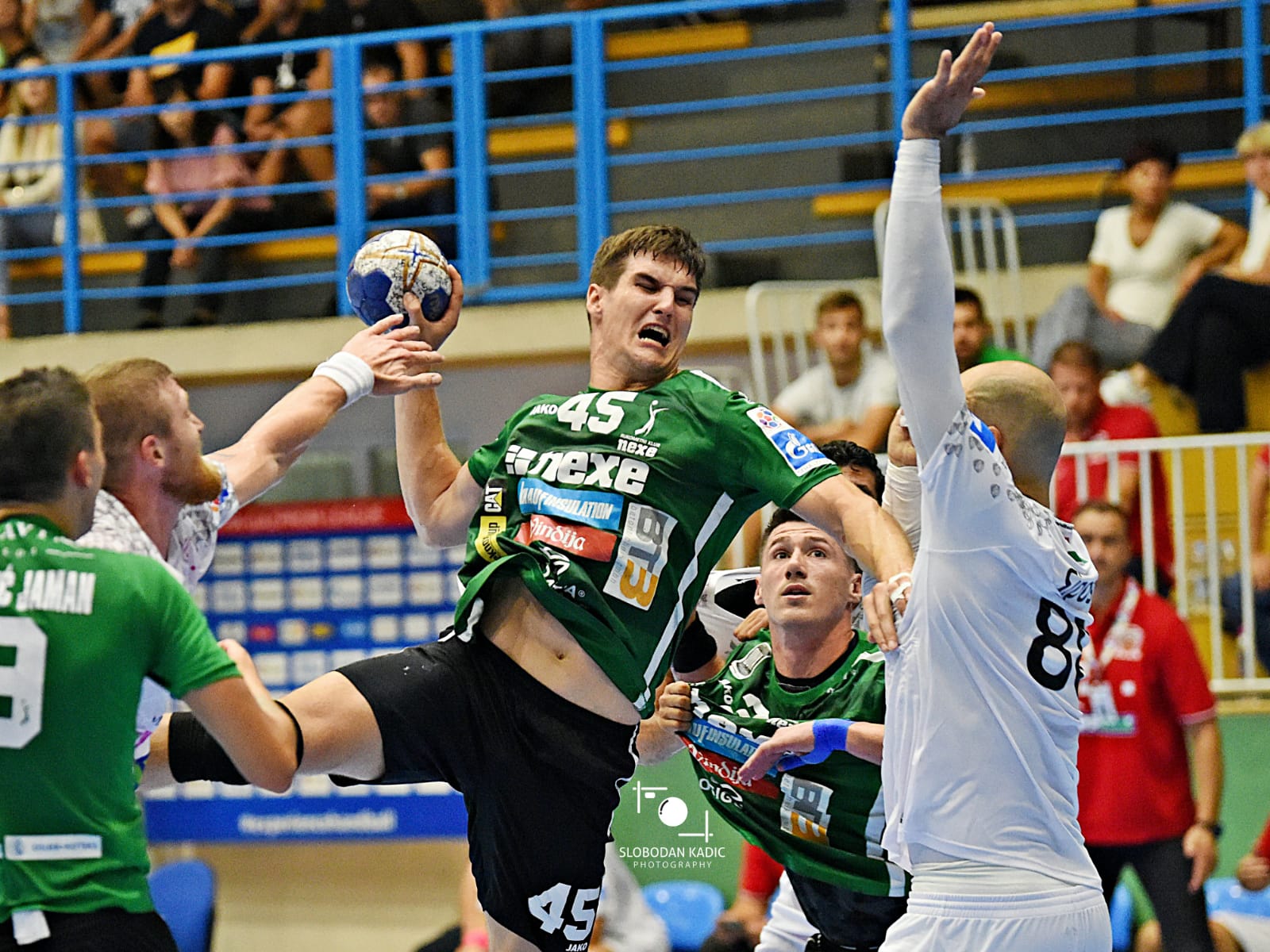
Slobodan Kadic
"I'm still talking with a hothead, but I think that they made less difference with our player. We fouled on two or three clean shots, hit the post, and instead of connecting, our shutdowns happened as well. Instead of scoring, we conceded goals on an empty goal three or four times. These gifts were not just given that way. They turned it into goals, and of course, morale, no matter how strong, must fall. We conceded too many goals. It is difficult when the Danish machine flies around the court," said NEXE coach Branko Tamše, who will not agree that the first half was good.
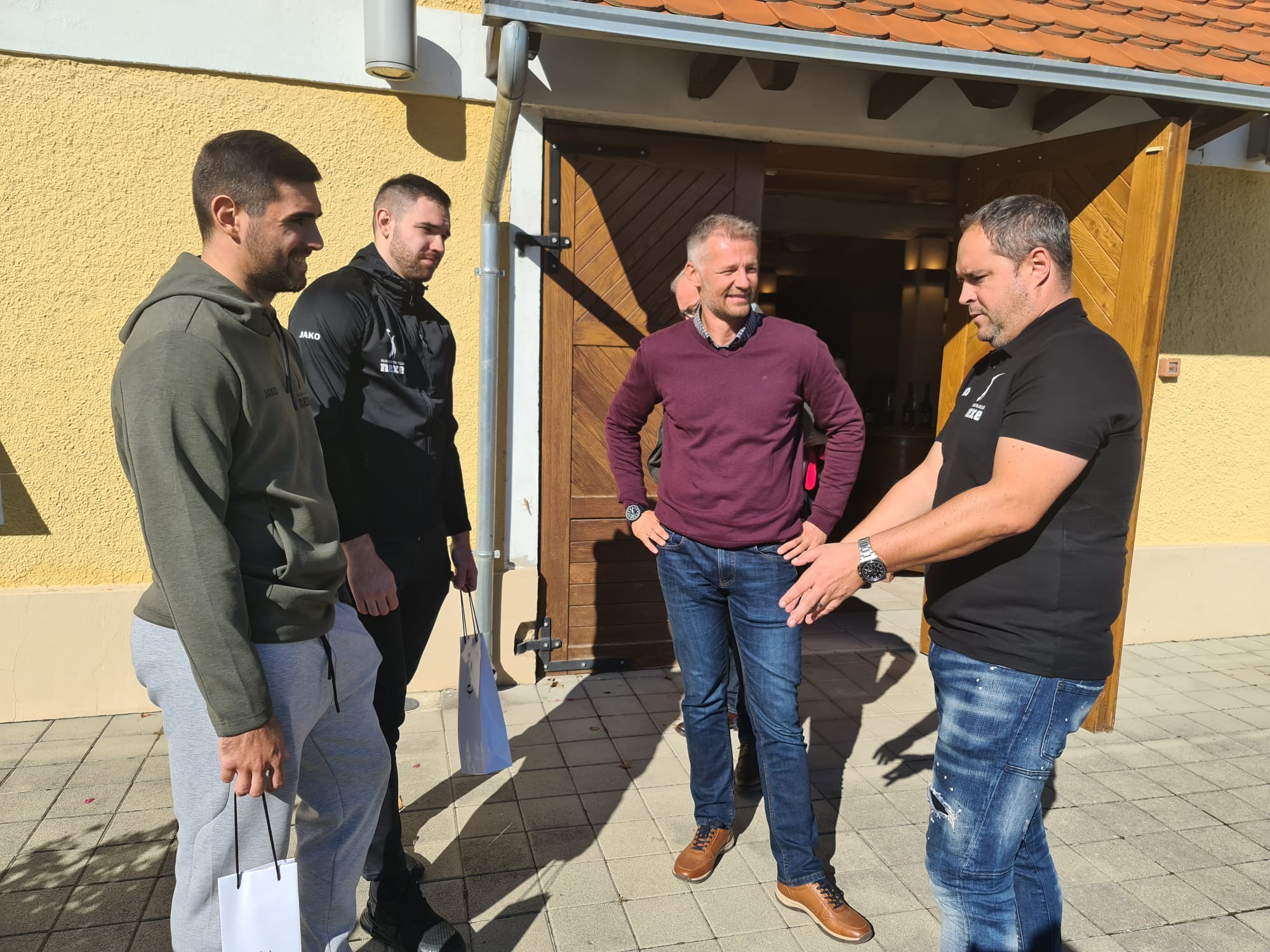
Slobodan Kadic
"The game is played for 30 minutes, and we were not great all 30 minutes. We were good as long as we had concentration and did what we agreed in both attack and defense. The goalkeeper also helped us then, but we didn't use it. First of all, in our transition, we were aggressive too few times, especially after good defense. And what now? Hope dies last. This is not a result that cannot be compensated. That is to be believed. And we believe that the NEXE players started believing in that as soon as they boarded the plane to return to Croatia."
He believes in a great turnaround.
"I already told the guys that we would be very, very prepared for the return match in a week. If they did it and beat six differences, then so can we. I firmly believe in that. Let us now realize all those posts and what went next to the goal. We hope to have a bit more breadth, but 16 who run against Silkeborg have to do everything to enter the EHF European League."
Tamše and his players are already inviting the audience.
"In Denmark, it smelled like victory, but as the match progressed, something was not good. We lost, but now we have to fix it and enter the group stage. Certainly, for every good goalkeeping defense, the defense is also important, i.e., teammates, so for me and my colleagues Radovanović and Kuzmanović it is imperative because then we are also good in our defenses," said Goalkeeper Moreno Car, adding that he counts on spectators and invites all fans to Našice because they also saw in Denmark how much the support from the stands meant to the hosts.
A real refreshment in NEXE's ranks is goalkeeper Dominik Kuzmanović from Dugo Selo, multiple Croatian champion at the cadet level and winner of the Dražen Petrović award as a member of the Croatian cadet national team that won gold at the European Youth Olympic Festival in Baku.
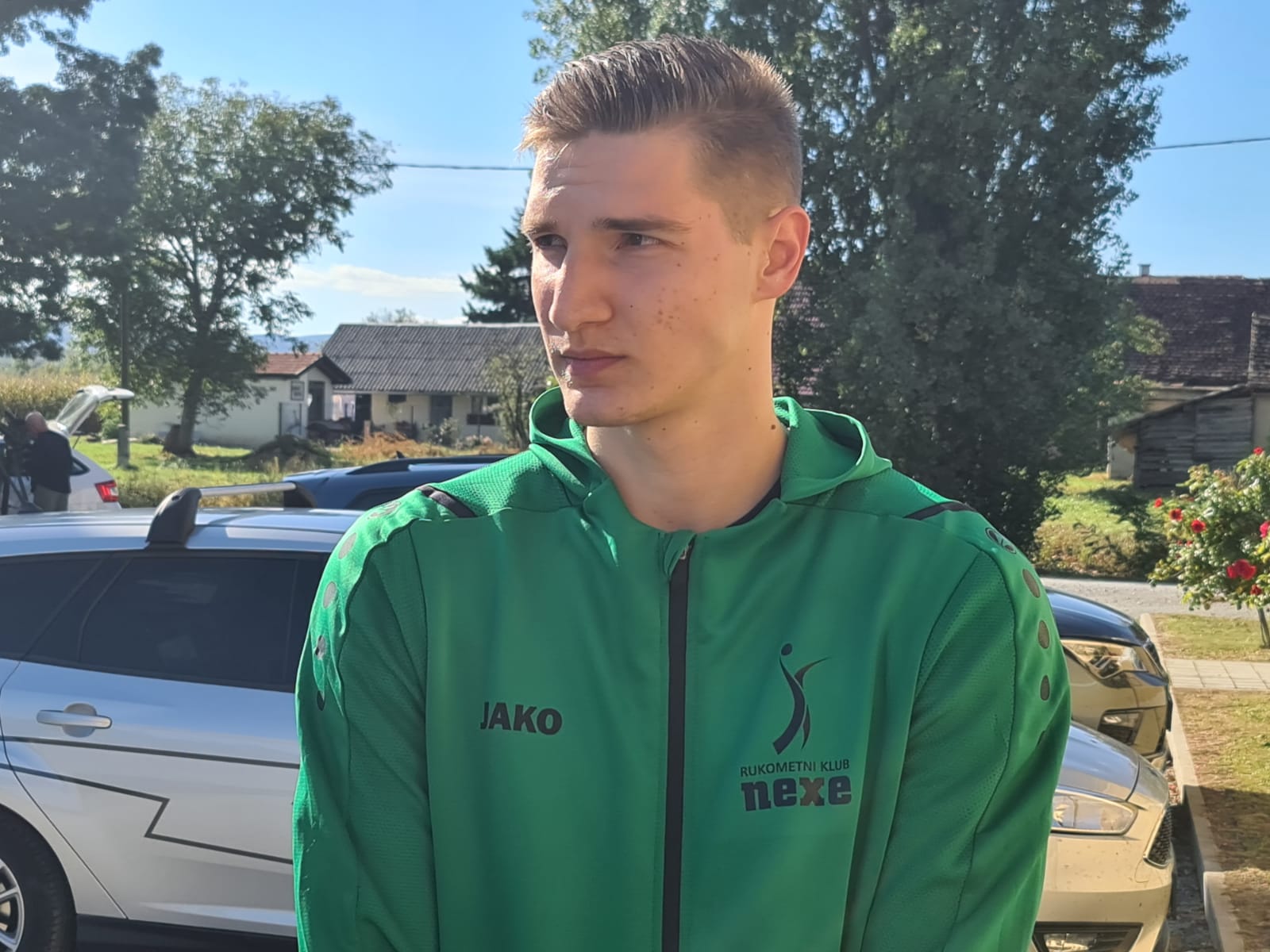
"I feel like I have been in NEXE for several years, my teammates have accepted me very well, and I am satisfied with Našice as a peaceful town. Although the summer was very successful for me, we won European silver at the cadet championships in Varaždin and Koprivnica. It remains a pity that we didn't get gold, but we will have two more competitions in the younger categories to be able to correct it," said Kuzmanović.
To follow the latest sports news in Croatia, follow TCN's dedicated page.
To learn more about sport in Croatia, CLICK HERE.
New NEXE Website and Handball Arena Announced in Našice
September 27, 2021 - A new NEXE website, vision, and strategy for the Našice handball club was announced for the upcoming period.
During the pandemic, but also otherwise, clubs rarely organize gatherings with journalists. Members of the "seventh force" are often considered a necessary evil, but the real shift in these relations was made by the leadership of RK Nexe from Našice. A gathering was organized in Feričanci, and a new vision and strategy of RK NEXE for the upcoming period were presented.
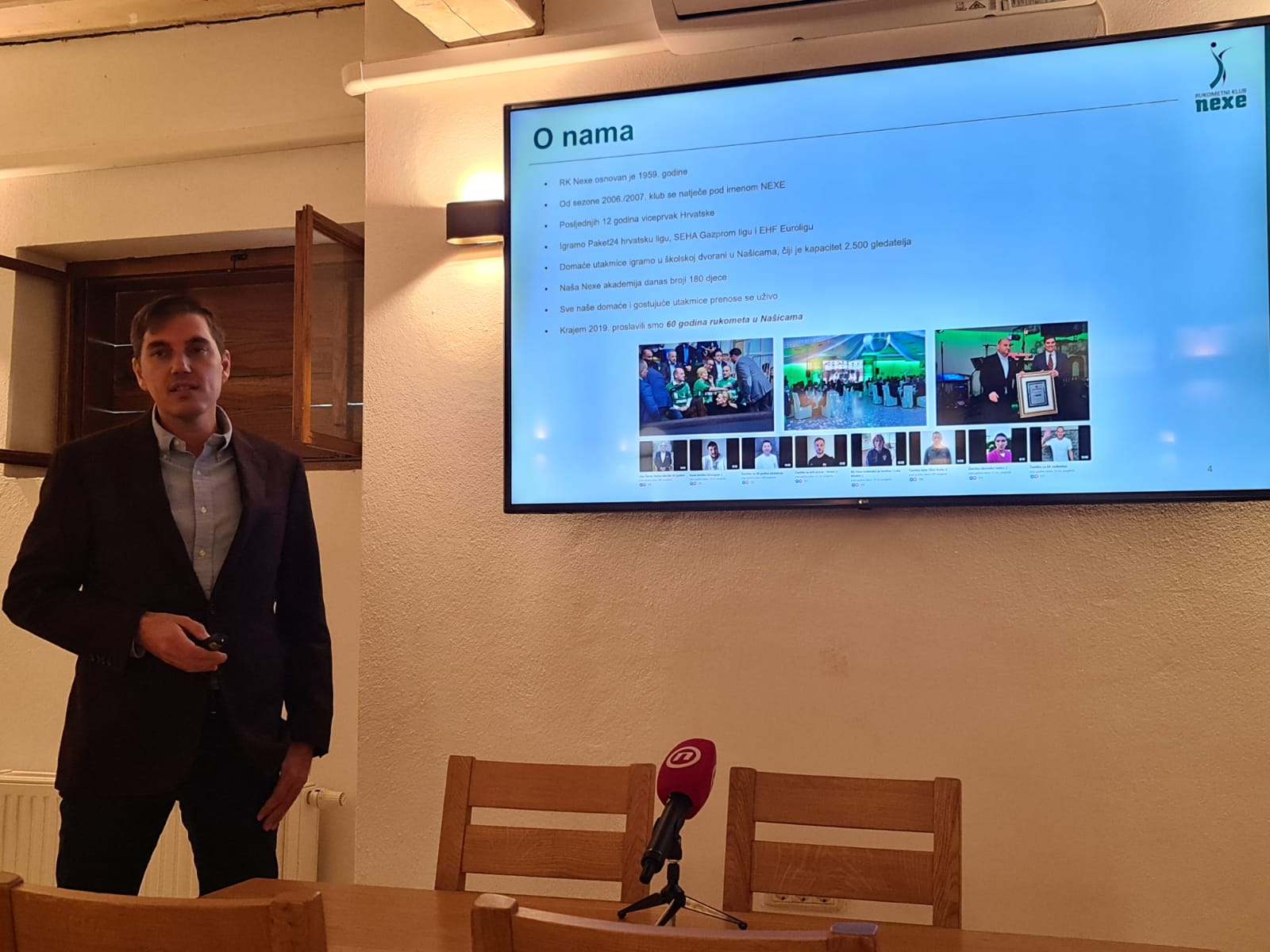
Slobodan Kadic
Welcomed with the sparkling wine "Nice To See You," the facilities and the new cellar were toured, wine was tasted, and new projects were presented, especially the plans for the construction of the new Nexe handball Arena in Našice. Josip Ergović, president of RK NEXE, briefly explained the club's vision, strategy and goals, and organizational structure. Among the planned new projects, he pointed out working with young people - the launch of NEXE Academy 2.0 and the Mini Handball League, in which children from two Našice and seven regional primary schools should participate.
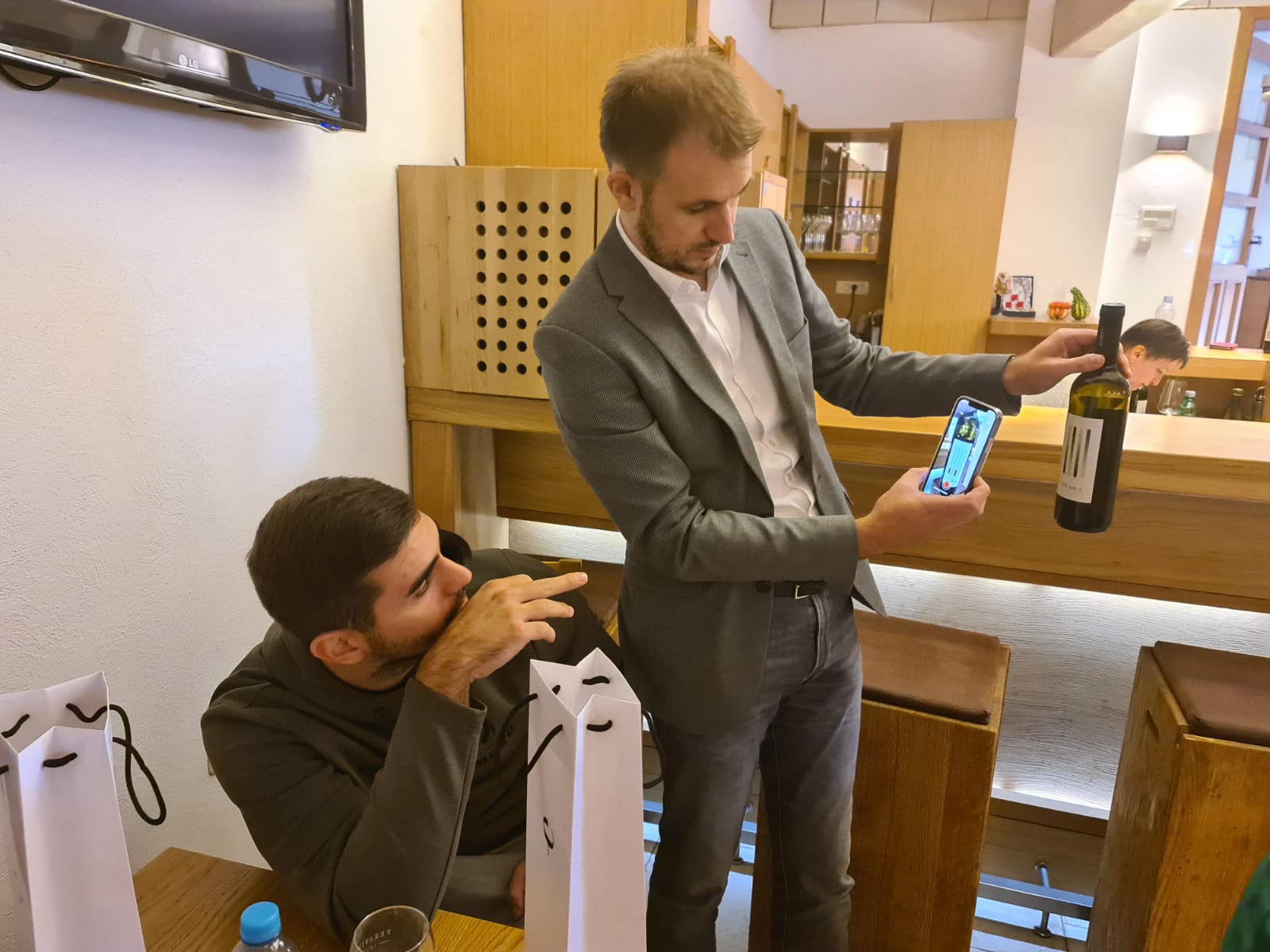
Slobodan Kadic
J. Ergović was pleased to announce good news regarding infrastructure. Namely, following the plan and estimates, as many as three sports halls should be built in the next five years. This is a hall in Feričanci that would be used mainly by athletes and recreationists from the area of the Municipality of Feričanci. At the same time, the development of handball in that area would be encouraged. The construction of the hall should be financed by European funds from measure 7.4.1.
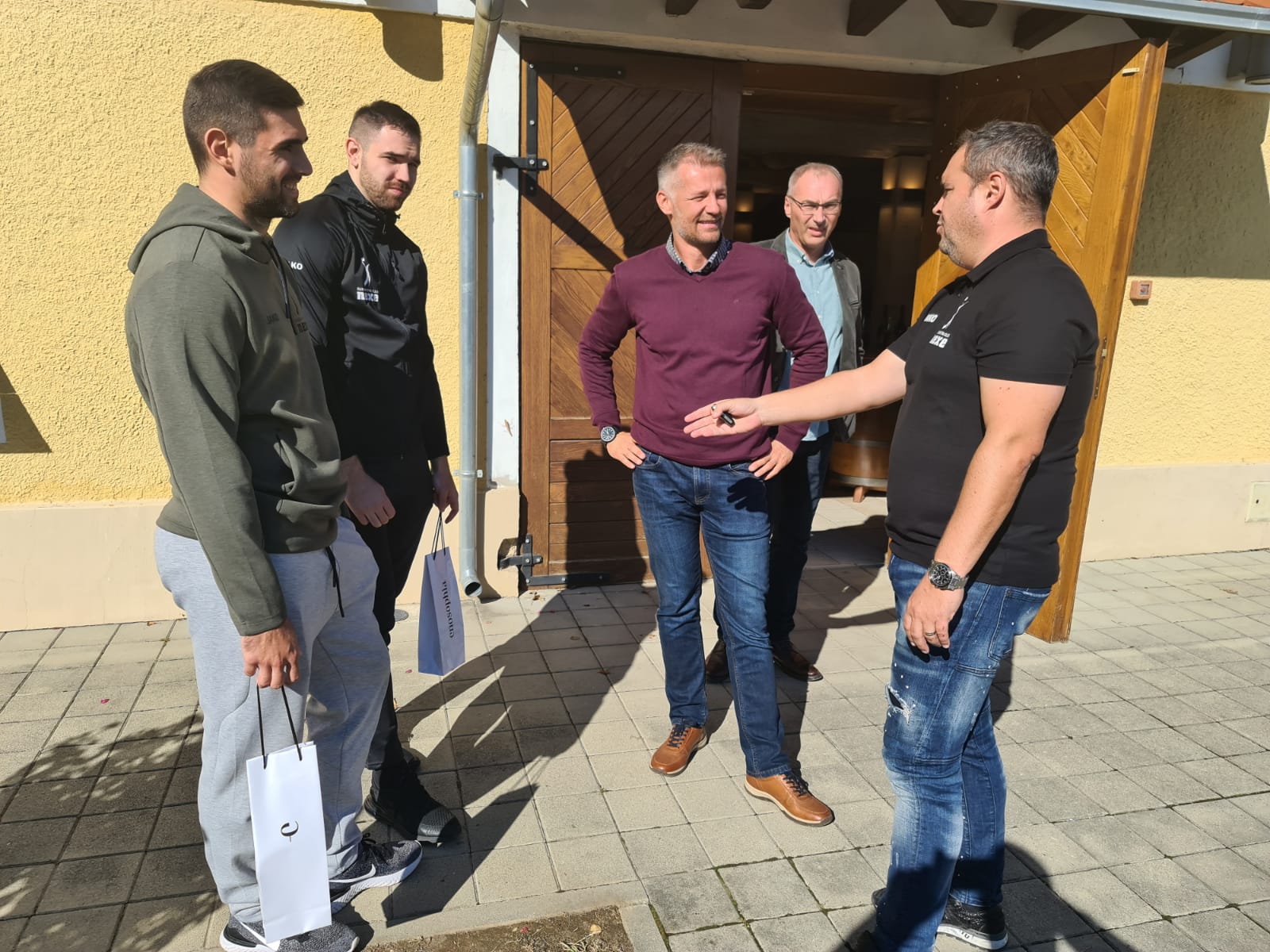
Slobodan Kadic
In Našice, the plan is to build a smaller training hall for training purposes, which sports clubs would mainly use for the needs of their younger teams, and the construction will be financed by NEXE d.d.
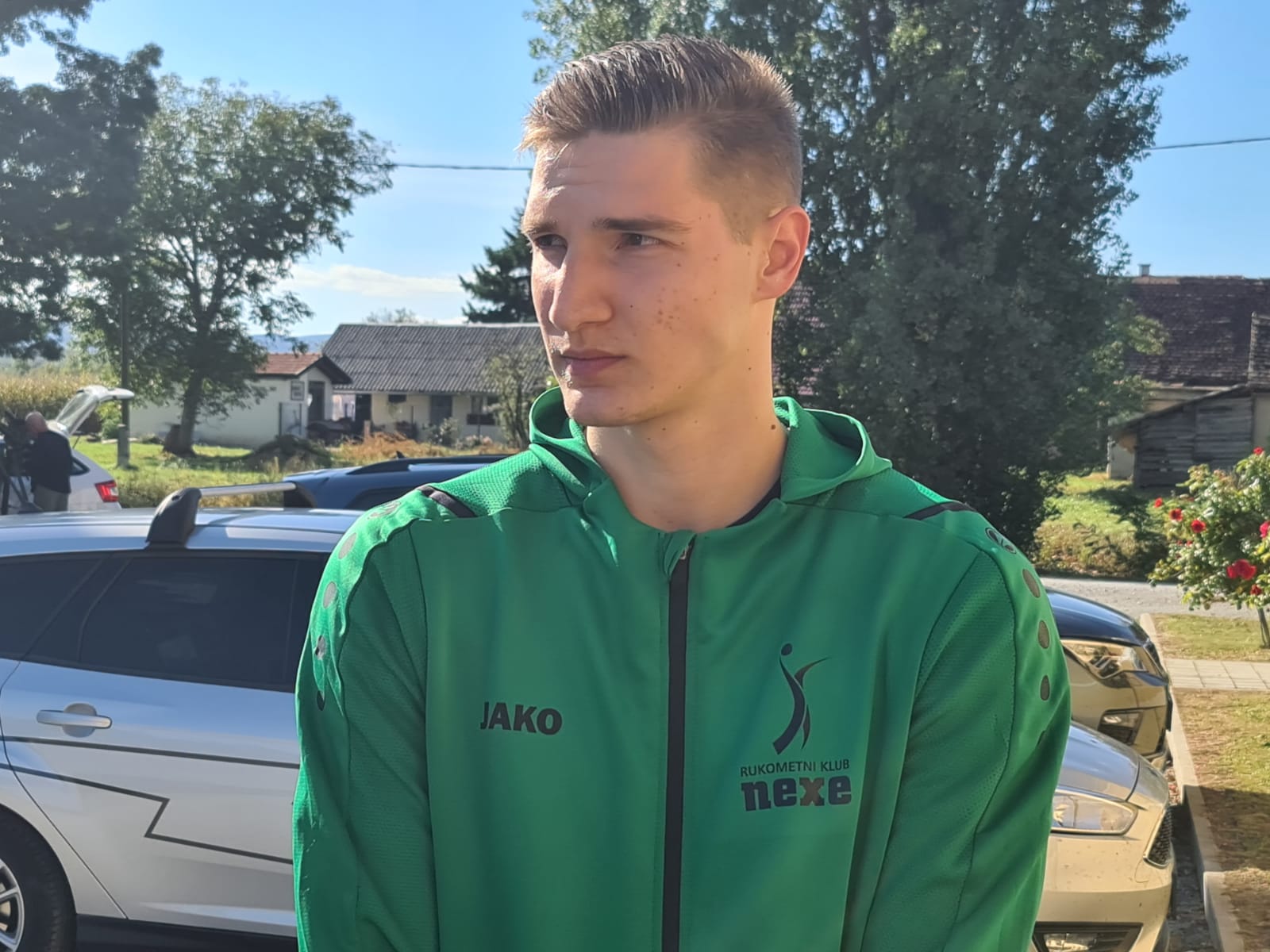
Slobodan Kadic
The largest and most significant investment would be the construction of the NEXE Arena, a modern arena-style sports hall with a capacity of 4,000 seats, which would provide the opportunity to hold competitions at the highest level. The construction company NEXE d.d., jointly financed with the City of Našice, Osijek-Baranja County, and state funds, and whether some other accompanying facilities will be built next to the hall has not been fully defined yet. The hall must be functional and beautiful, but, Ergović continues, there should be space for fitness, cafe, or restaurant so that people can gather and socialize there, said J. Ergović, emphasizing that they still thought about the pool. However, it is difficult to do because it makes the project very expensive.
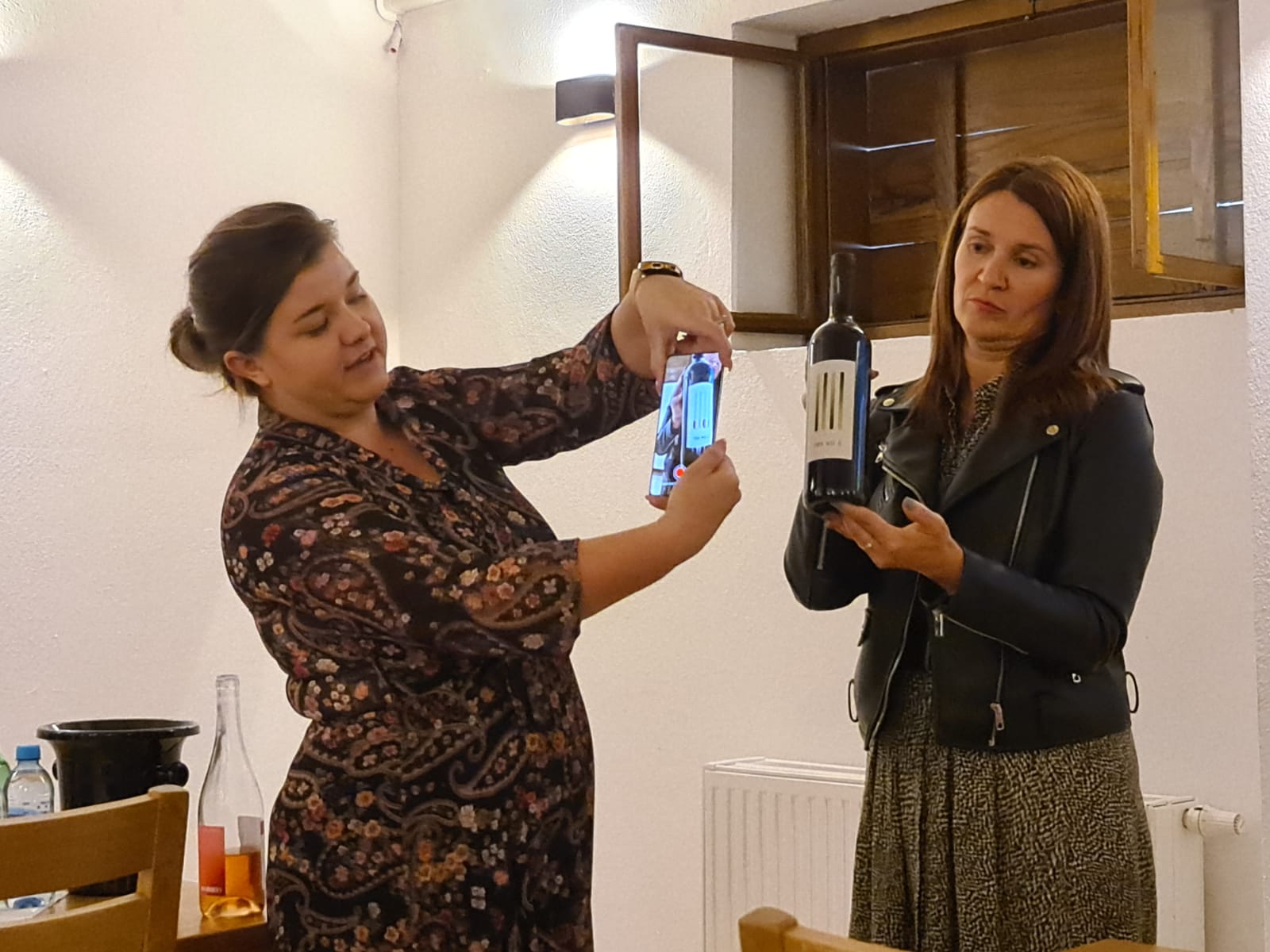
Slobodan Kadic
The new RK NEXE website was also presented, which was discussed by Milan Zdjelar from the German company COBE, which was hired to create the site and is also one of the club's sponsors. The site also contains a webshop where you can buy RK Nexe jerseys and T-shirts at affordable prices and souvenirs and match tickets. The joint gathering of journalists and representatives continued at the Goveđa glava site with a reception and tasting of Enosophia wine.
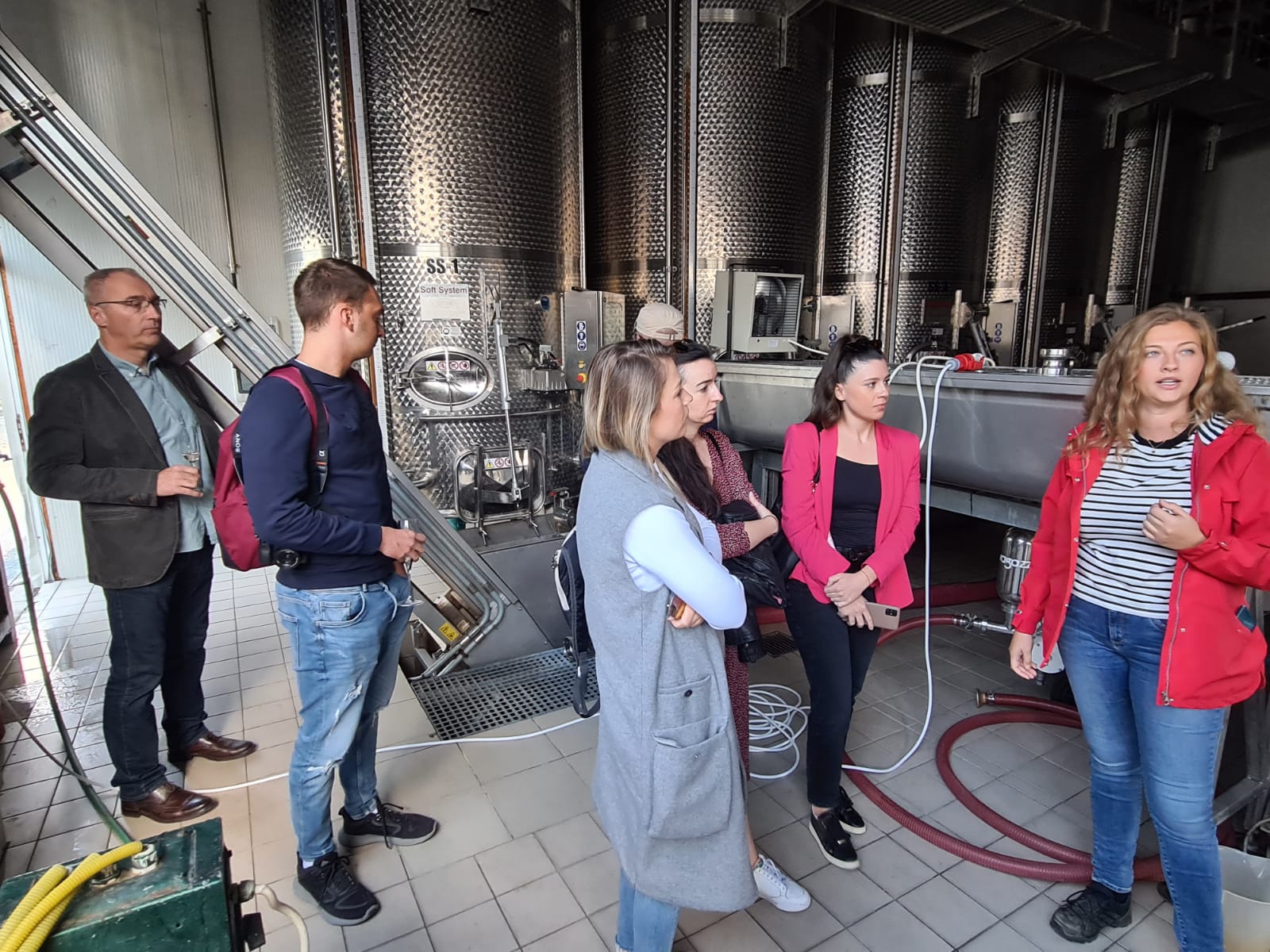
Slobodan Kadic
To follow the latest sports news in Croatia, follow TCN's dedicated page.
To learn more about sport in Croatia, CLICK HERE.
1,326,000 Citizens Self-Enumerate by 3 PM Sunday, Says Statistical Office
ZAGREB, 26 Sept, 2021 - More than 1,326,000 Croatians have self-enumerated by 3 pm on 26 September in the first phase of the 2021 census of population, households and dwellings, the national statistical office said on Sunday.
According to data on the number of persons who have self-enumerated at the e-Građani portal, most or 403,183 of the people who have self-enumerated live in the City of Zagreb.
Zagreb is followed by Split-Dalmatia County, with 132,662 self-enumerated citizens, and Primorje-Gorski Kotar County, with 113,518 citizens who have completed census questionnaires online on their own.
The first phase of the 2021 census, during which citizens can self-enumerate, ends at midnight on Sunday, by which time all citizens who wish to self-enumerate, can do so.
On Monday, 27 September, the second phase of the census starts, with census-takers conducting the census by visiting households. Census-takers will take from citizens who have self-enumerated the control codes that prove that they have successfully self-enumerated.
For more about Croatia, CLICK HERE.
Scientists Call for Concrete Action Plan to Protect Adriatic
ZAGREB, 26 Sept, 2021 - A group of Croatian scientists has issued a public letter underlining the importance of adopting an agenda or a specific action plan for the protection of the Adriatic Sea, vital for the sustainable development of the Croatian society, and their appeal was forwarded by the Eko Kvarner NGO on Sunday.
The scientists, who in September attended a conference on the Adriatic Sea eco-system on the island of Krk, say in their appeal to the prime minister, the parliament speaker and the public that the research of the Adriatic had been conducted for years but that there was a lack of systematic interdisciplinary research to account for "galloping changes."
They say that the changes are irreversible and that the rise of the sea temperature also causes a rise in the sea level and sea salinity, as well as increased sea stratification, and storm tides.
They warn about a growing number of alien species in the Adriatic, of which many are invasive and even poisonous, as well as about the loss of biodiversity.
Tourism-related activities, along with climate change, account for most of the pressure on the Adriatic, the scientists say, stressing that with waste water and intensive farming, more food and various harmful substances end up in the sea, accumulating in sea organisms through food chains.
"On top of that, plastic and other waste is becoming an increasingly big problem, with potentially far-reaching consequences for the quality of life in the sea and human health," they warn, pointing also to the problem of uncontrolled construction in the coastal areas, which results in the loss of the coastal seabed necessary for the propagation of sea organisms.
The scientists consider more active protection of the Adriatic, a better understanding of how its eco-system functions, and the adoption of regulations aimed at its protection as the solution for more sustainable development.
They propose the establishment of an advisory task force comprising scientists to participate in defining the agenda on measures of protection and underline the importance of developing IT technologies to monitor changes in the marine environment and involving citizens in monitoring those changes.
For more on lifestyle, follow TCN's dedicated page.
For more about Croatia, CLICK HERE.


